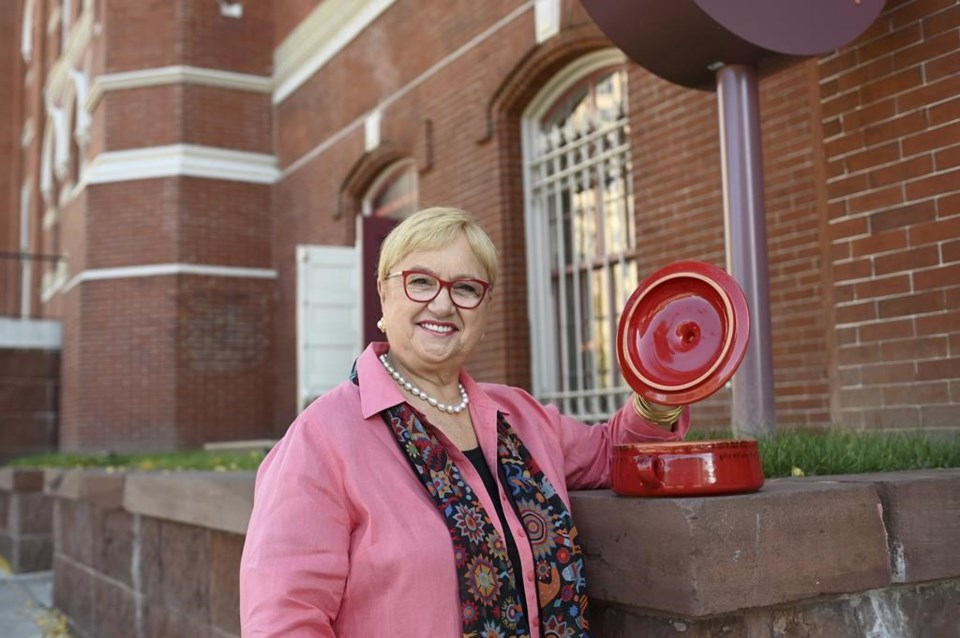NEW YORK (AP) — In her new PBS special, Lidia Bastianich samples the foods of the world without ever crossing the U.S. border.
The Emmy-award winning TV host, author and restaurateur explores the immigrant experience through food in It airs May 30 on PBS and will also stream starting that day on PBS.org and the PBS app.
Bastianich visits a Bhutan refugee who has built a new life in Ohio, Cuban immigrants feeding people in Kentucky, and Indian Americans creating businesses in California. In Texas, she meets Afghan refugees helping new arrivals, and a second-generation Vietnamese American who has multiple restaurants.
“There were a lot of interesting connections between the food and them and the new culture and me,” Bastianich says. “Food somehow opens the doors for me all the time.”
Bastianich herself was a Cold War refugee who turned a knack for homestyle Italian cooking into an empire of restaurants, products and media.
“I came here when I was 12 years old. A great opportunity was given to me and to my family. And I wanted to share that because sometimes I think that America is maligned. It’s not appreciated the way I would like it,” she says.
In the special, Bastianich travels to both new and established immigrant communities, and asks arrivals about their motivations, challenges and experiences.
“There is this tremendous difference of flavors, but there is a commonality of cooking,” she says. “Food is not threatening. Food is positive.”
In Reynoldsburg, Ohio, she meets the man from Bhutan, who spent 18 years in a refugee camp in Nepal and was resettled in America, arriving with just $9. He landed on a Thursday and by Saturday morning was working at a 7-Eleven. He became a U.S. citizen and a city council member.
“America is all about immigrants. And as immigrants, we owe it to this country to give back,” Bastianich says. “Once we are comfortably set and we are given the opportunity we need, it's important to really become part of this and give back.”
In Louisville, Kentucky, she is fed and serenaded by Cuban immigrants, one of whom started as a waiter before opening a restaurant with his maxed-out credit cards. In Bakersfield, California, she meets a community of Punjabis who have opened a roadside truck stop, and others who are almond farmers and processors.
Zara Frankel, senior director of programming and development at PBS, hopes the special “will inspire people to step outside their comfort zone, learn about new ingredients, test out unfamiliar recipes, and taste something they’ve never experienced before.”
Among her stops, Bastianich visits Houston to meet “MasterChef” season-three winner Christine Ha, who often mixes her Vietnamese heritage with Tex-Mex elements. The two chefs make a braised pork belly dish, while Ha recalls being teased as a youngster for the pungent lunches she brought from home.
“For me, being able to take these dishes that were once uncool and unpopular, and the things I would take to school and get laughed at or teased about, and now being able to introduce it onto the menus at my restaurants and having people excited to try it, is the ultimate accomplishment,” Ha says.
Throughout the series, Bastianich and the immigrants share their food, from stuffed flatbread from India to the Cuban classic ropa vieja. She marvels at the different flavors but also the commonalities.
Bhutan's pea soup, for instance, "reminded me so much of the American split pea soup or, as we make it in Italy, the dry fava soup,” she says.
Over a table — or sometimes on the floor — Bastianich eats meals that the immigrants say remind them of their homelands, and shares their new dreams.
“No matter what culture is getting together — at the table or floor — to eat together, that’s the moment of real exchange and understanding and nurturing and wanting well for somebody,” she says.
One of the most personal visits Bastianich makes is with Polina Frishko, a new Ukrainian refugee who fled the war in her homeland with her teenage son. They first got to a camp in Poland and then ended up in Hartsville, South Carolina, thanks to a resettlement group.
“When he smiles, when he is not in danger, this is my happiness,” Frishko says.
The connections between Bastianich and Frishko are striking. Bastianich was born in 1947 in Istria, an Italian territory ceded to Yugoslavia after World War II. She spent the first years of her life under communist rule, then fled with her family across the border to Italy. There they lived in a refugee camp for two years until an aid organization helped bring them to New York in 1958.
Bastianich laughed that Frishko's son has jumped feet-first into American life and culture, hardly looking back.
“I wanted to become American so quickly, so badly,” she says. “That doesn’t mean that I forgot who I am. Later on in life, I had this desire to combine my birth and my adoptive cultures, put them together, and I feel all the richer for it.”
___
Mark Kennedy is at
Mark Kennedy, The Associated Press




